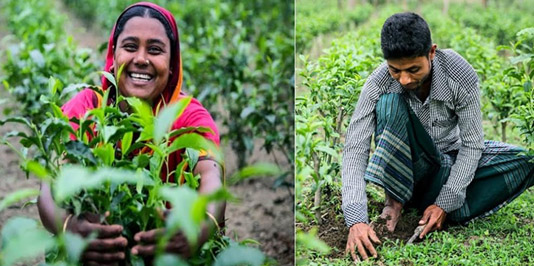RANGPUR, Jan 21, 2020 (BSS) – The ‘Kartoa Valley’ ecological zone
comprising of five sub-Himalayan northern districts witnessed another all-time record production of about 96-lakh kg made-tea last year.
Officials of Bangladesh Tea Board (BTB) said commercial-basis tea
cultivation on the `small-scale gardening-basis’ continues boosting in the
valley to increase production ushering a new horizon in the agriculture
economy.
Talking to BSS, Senior Scientific Officer at Bangladesh Tea Research
Institute Dr. Mohammad Shameem Al Mamun discussed the history of the
beginning of tea farming and its rapid growth on the Kartoa Valley.
“Being directed by the then Prime Minister Sheikh Hasina during her
visit to Panchagarh in 1996, the then Deputy Commissioner Rabiul Islam
planted some tea saplings on Panchagarh Circuit House premises on
experimental basis,” he said.
Getting better results, a BTB team conducted feasibility study in
Panchagarh and Thakurgaon districts in 1999 and found 16,000 hectares of land
suitable for commercial basis tea cultivation. “Later, Tentulia Tea Company
Limited first started farming tea in Tentulia upazila of Panchagarh in 2000,”
said Shameem, also Project Director of the Northern Bangladesh Project of BTB
at its Regional Office in Panchagarh.
Other companies and local farmers also started commercial-basis tea
farming since 2005 in Panchagarh.
The BTB launched the ‘Expansion of Small Holding Tea Cultivation in
Northern Bangladesh Project’ by BTB since 2015 at Taka 4.97 crore to bring
more than 500 hectares of land within 2020 in the valley prompting faster
expansion of tea cultivation.
Dr. Shameem said owners of nine registered and 19 unregistered gardens
and 6,558 small holders cultivated tea on 8,681 acres of lands in Panchagarh,
Thakurgaon, Dinajpur, Nilphamari and Lalmonirhat producing 4.69-crore kg of
green tea leaves in 2019.
The 18 companies operating in Panchagarh and Thakurgaon districts, are
processing green tea leaves after producing those in their gardens and
purchasing from smallholders to produce ‘made-tea’ for selling at Chittagong
Auction Market.
“After processing of 4.69-crore kg of green tea leaves, the 18 tea
processing factories produced 96-lakh kg made-tea in 2019 in the valley,” he
said, adding that made tea production stood at 84.67-lakh kg in 2018 and
54.40-lakh kg in 2017 there.
With continuous expansion of tea cultivation on `small-scale gardening-
basis’, production of green tea leaves is boosting bringing fortune to many
farmers and creating jobs for over 12,000 tea workers, mostly women, in the
valley.
Smallholder tea grower Matiar Rahman of village Sonapatila in Panchagarh
said he started tea farming on his 4.50 acres of plain land for the first
time in 2002.
“Currently, I am cultivating tea on 52 acres of land and selling my
green tea leaves to tea processing companies,” Rahman said.
He called upon the authorities concerned to increase purchase rate of
green tea leaves from smallholder tea growers to Taka 35 from present rate of
Taka 16 per kg to make tea farming profitable.
Talking to BSS, tea-leaves plucking female labourers Nasima Begum, Noor
Banu and Muktara Begum of Tentulia upazila said they are earning Taka 500 to
600 as daily wages by plucking green tea-leaves to lead a better life.
President of Bangladesh Small Tea Garden Owners’ Association Amirul
Haque Khokan said tea cultivation on `small-scale gardening-basis’ has a
brighter prospect to change fortune of local farmers and improve their living
standard.
He called for stopping smuggling of poor quality made tea from the
neighboring country, imposing higher tax on tea import and increasing current
Taka 16 purchasing price of green tea-leaves per kg to Taka 35 to save the
local farmers and tea industry.



